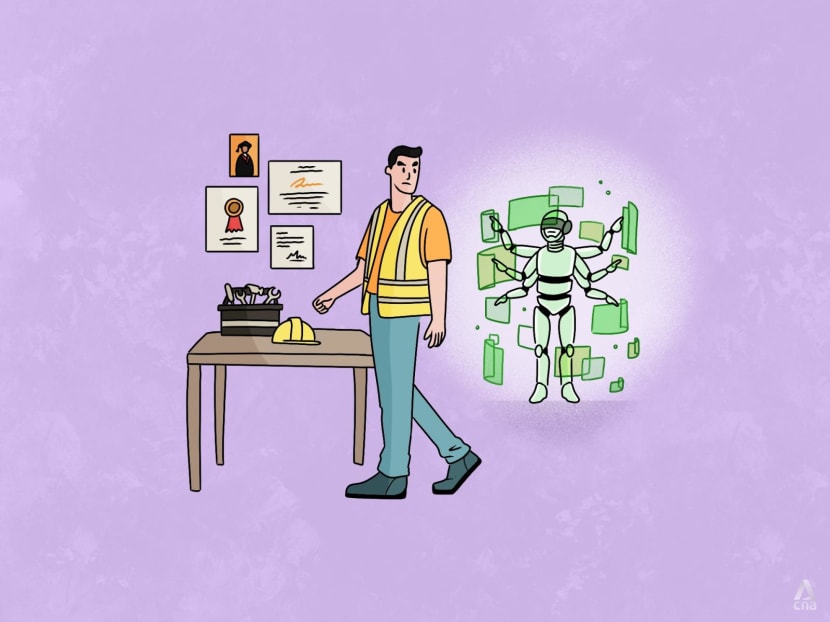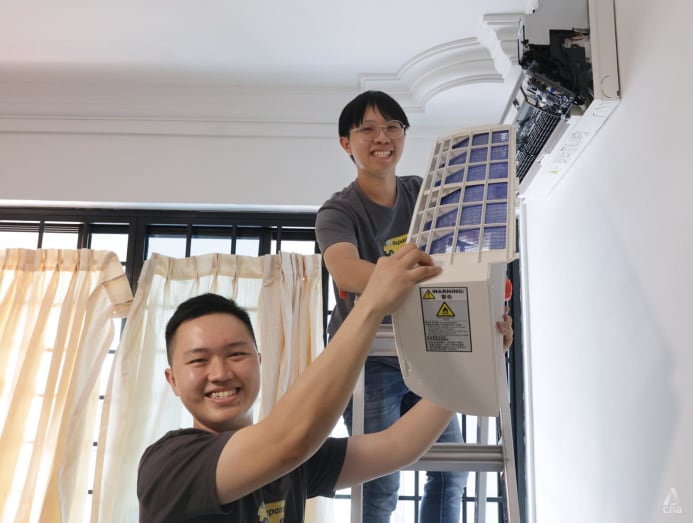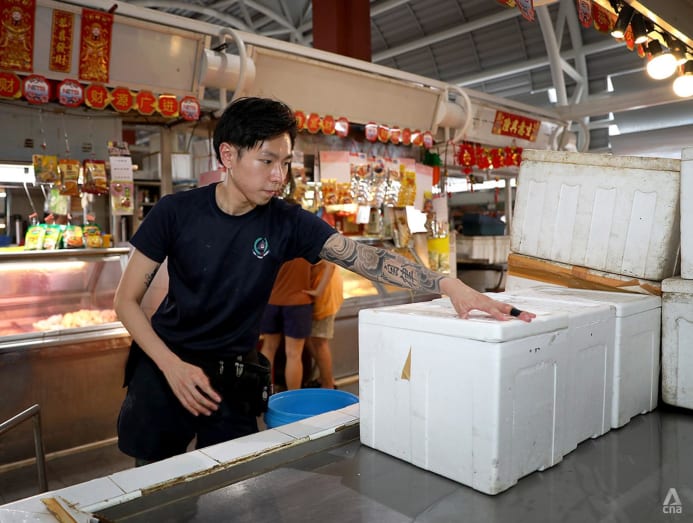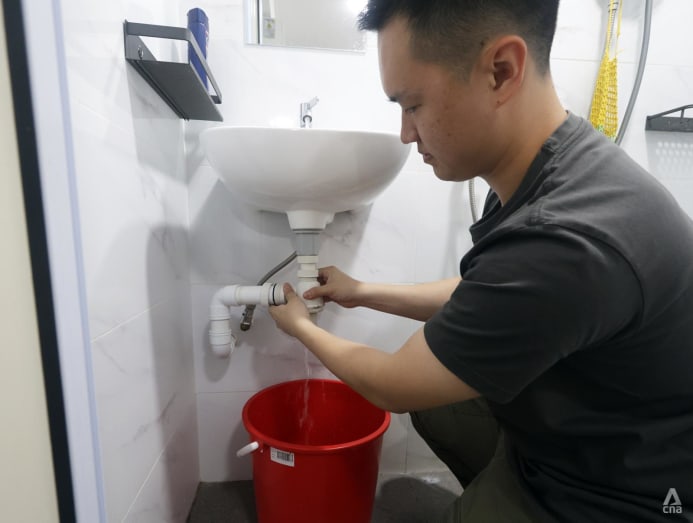Blue-collar jobs gain appeal as AI disrupts office work, but it's not the easy way out you think it is
It is practically impossible to predict how technology and artificial intelligence will disrupt work in the future. Experts say the best defence against being made obsolete is to deepen one's skills regardless of the path one chooses.

Based on a survey in May 2025 by Resume Builder, a resource site for resume templates and career tips, 37 per cent of Gen Z adults in the United States who have bachelor's degrees are pursuing blue-collar or skilled-trade jobs. (Illustration: CNA/Nurjannah Suhaimi)

This audio is generated by an AI tool.
Not too long ago, having a diploma or degree was a guarantee of a corporate job and a climb up the professional career ladder.
But these days, with generative artificial intelligence (AI) and other technologies disrupting and restructuring industries once considered prestigious and stable, such as technology and finance, there has been a growing anxiety among young people about whether they should enter these fields – if they can even find a foothold in the first place.
Earlier this month, The New York Times described how computer science graduates in the United States, who took up the field of study barely a decade ago while banking on promises by technology honchos of lucrative salaries and excellent career prospects, are now finding it difficult to get employed.
Due to the proliferation of AI programming tools, companies can now afford to do away with junior software engineers, eliminating entry-level jobs. As a result, graduates of the once-coveted majors of computer science and computer engineering are seeing some of the highest unemployment rates among fresh graduates, The New York Times reported.
When asked for his advice on facing the world today that is full of job displacements, Nobel Prize-winning computer scientist Geoffrey Hinton – known to many as the "Godfather of AI" – said in a podcast in June: "Train to be a plumber."
And it seems that some young workers are taking this advice to heart.
In the US, 37 per cent of young adults from Generation Z in their 20s now who have bachelor's degrees are pursuing blue-collar or skilled-trade jobs. This is based on a survey in May of around 1,400 Gen Zers by Resume Builder, an online platform that provides resume templates and other resources for jobseekers.
Of those who were pursuing blue-collar work, 30 per cent said that such trade jobs have better long-term prospects, while 25 per cent said that such jobs are less likely to be replaced by AI.
Another survey in June by Zety, another online site that provides resume templates, painted a similar picture: 65 per cent of 1,000 Gen Z workers who responded said they did not believe that a college degree offers protection from AI-driven job loss.
Like their American counterparts, Gen Zers in South Korea are also shifting towards blue-collar work, with 63 per cent of them viewing such jobs favourably, while applications to vocational schools and the number of young people holding trade-skill licences are on the rise, Korean news media site The Chosun Daily reported in May.
In Singapore, recruiters who spoke to CNA TODAY differed in their observations on the extent of degree and diploma holders taking up blue-collar work here, or even if it is happening at all.
For instance, job-search site Indeed has no data to show a clear trend of this phenomenon at this point, its representative Saumitra Chand said.
Others who are seeing such a movement are attributing it to the challenging job market pushing jobseekers into blue-collar work, rather than the jobseekers seeing manual work as an attractive refuge from AI-led disruption.
In any case, if AI-proofing one's career is the biggest concern, labour and human resource (HR) experts are advising against being too hasty in following the footsteps of American or South Korean workers in swopping suits and laptops for gloves and toolboxes.
This is because, at the most basic level, the conditions that make blue-collar jobs more alluring in other economies may not necessarily apply in Singapore, they said.
Another reason: It goes without saying that AI and technology are so pervasive, they will likely disrupt – or even replace – blue-collar jobs that are still untouched today.
So, if both white-collar and blue-collar jobs are susceptible to disruption, albeit in varying degrees, how then can Singaporeans find stability in their career paths?

MANUAL WORK NOT A REFUGE FROM AI
Labour and economic experts said that conditions that may make blue-collar work a tenable alternative in other economies might not be present in Singapore.
Economist Song Seng Wun noted that Singapore has been paying a lot more attention over the last 60 years to building up a knowledge-based economy.
The economic adviser at financial services provider CGS International said this is why the market here is "geared towards higher-paying jobs generally in the services-providing industries".
The nation's labour market thus differs in terms of composition and income.
For instance, the professionals, managers, executives and technicians (PMETs) make up 63.7 per cent of residents here. In comparison, white-collar knowledge workers make up 45 per cent of household employment in the US, news site Business Insider stated.
In the two US surveys by Zety and Resume Builder, a significant proportion of Gen Zers believed that they could command similar or higher pay working in trade skills as they would in a white-collar role.
On the other hand, experts in Singapore noted that there is generally a wider pay gap between white- and blue-collar jobs here, notwithstanding efforts being made in recent years to narrow this difference.
The latest Labour Force in Singapore report by the Ministry of Manpower (MOM), released in January this year, showed that resident PMETs showed a greater incidence of upward income mobility than non-PMETs.
For instance, 80.9 per cent of managers and administrators as well as 75.2 per cent of professionals moved into higher income bands between 2021 and 2024. Comparatively, this happened for 41.8 per cent of craftsmen and related trades workers, and 40 per cent of plant and machine operators and assemblers.
Labour economist Walter Theseira, an associate professor from the Singapore University of Social Sciences (SUSS), also noted that different economies differ in terms of national policy when it comes to protecting blue-collar jobs from displacement, be it from immigration or technological disruption.
"For instance, in many countries, they are okay with immigrants being doctors or professionals but they don't allow immigrants to take lower-skilled, blue-collar jobs," he added.
"Together with other restrictions, such as unionisation and so on, it basically means that those (blue-collar) jobs often have some kind of labour-market protection."
Singapore, on the other hand, "would never resist automation" to protect blue-collar jobs, or jobs in general, Assoc Prof Theseira said. This is due to the shortage of manpower and an ageing workforce, which requires the nation to be open to automation and a complementary foreign workforce to expand the productive capacity of the economy.
These differences aside, much like some basic white-collar roles, blue-collar jobs that are routine and repetitive are just as susceptible to replacement by AI or automation, the experts said.
Some blue-collar roles such as drivers or delivery riders may also provide little opportunity for direct career growth. In these instances, their earnings are limited by the number of trips they can make in a day, and efficiency is expected to only decline with age.

HR solutions provider Elitez Group and jobseeking platform company FastCo told CNA TODAY that they are observing a rise in tertiary-educated jobseekers looking for non-corporate jobs, although it is not for fear of AI disruption, and more as a stopgap measure amid a tough job market.
Mr Julian Tan, founder and chief executive officer of FastCo, said that between 2023 and 2024, there was a 16 per cent year-on-year increase in applications from diploma-holders or degree-holders for full-time non-executive roles on FastJobs.
FastJobs is Fastco's job portal for non-executive roles.
In the same period, a 31 per cent increase in applications was observed for contract roles, he said.
When asked whether this rise was being driven by anxieties over AI specifically, Mr Tan said that it may have been a factor "at the margins", and that retrenchments due to restructuring are the main reason nudging PMETs to consider non-PMET roles.
Sentiments towards AI among workers here are also in stark contrast to the bleak outlook in the US, the experts noted.
Job agency Randstad Singapore's 2025 Employer Brand Research, which polled more than 2,500 employees here across various fields of work, reported that as many as 50 per cent of workers anticipated that AI would help them in their work, while only 6 per cent expected to lose their jobs due to AI.
Mr Derrick Teo, co-founder and chief executive officer of manpower consultancy Elitez Group, said that AI is contributing to some extent to the trend of tertiary-educated workers turning to non-PMET jobs here, but in a different way from how it is playing out elsewhere.
"I don't think it's AI driving people into doing blue-collar work," he said. "It's more of AI currently causing companies to withhold on hiring. Therefore, fresh graduates have to turn to temporary assignments and some of these work assignments are blue-collar."
He also said that the most popular positions sought by tertiary-educated jobseekers are in the fields of retail and food-and-beverage (F&B), among others.
"It's predominantly because they also see that these roles are relatively easy to enter and exit, so that they are able to hop onto a white-collar full-time role should the opportunity arise."
HOW TO MAKE BLUE-COLLAR WORK PAY OFF
That said, there are people with a tertiary education who have built a meaningful and successful career in a skilled trade.
Mr Zames Chew started his own handyman business via Repair.sg at the young age of 16 and has continued in the trade even after graduating from his diploma course in international business.
The 25-year-old said: "For the first seven years of the nine-year journey that I've had, most of my time was spent doing the work of fixing and repairs rather than building a business."
But his business has since grown and although he "deeply, genuinely" prefers to get his hands dirty and serve clients directly, he now spends about 75 per cent of his time running the business – hiring people, liaising with clients and managing his team of more than 20 employees, a testament to the growth potential in blue-collar work.
He runs the company with his younger brother Amos Chew, 23, who is also a diploma-holder.

Similarly, 36-year-old Luqman Abdul Latiff has seen progress in doing carpentry and renovation work.
His journey began when he found the quotations given by contractors for his flat's renovation to be expensive. Mr Luqman, who is also a real estate agent, began learning carpentry and woodworking from online tutorials three years ago.
The father of four, who graduated with a diploma in graphic design, began putting up videos of his DIY works online in hopes that other budget-conscious homeowners would benefit from them.
Instead, he began getting requests from people to do their renovation works and the demand snowballed to such an extent that he had to set up a business and hire workers.
"It started with me and just one Bangladeshi worker whom I taught. Now I have 50 staff members," he said.
In the early days of his business, 80 per cent of his income still came from his realtor work. Today, the renovation business that began as a hobby now brings in more than 90 per cent of his income.
Another young Singaporean who made the switch is 27-year-old Delonix Tan, who initially helped out at his family's business, SanDai Fishball, out of a sense of duty, but later developed such a passion for it that he has turned it into his full-time work.
"My family business is something that is emotional for me. It carries the hard work of both my grandparents and parents. I find it hard to let go of what they have preserved for such a long time," he said.
"Also, I grew up in the wet market and it is sad to see the culture dying off as the older vendors retire. So I hope to be able to play a part in carrying on this unique Singapore culture."
He has a diploma and a degree in business, and held a full-time white-collar job as a regional salesperson selling copier supplies for almost two years before joining SanDai Fishball full-time.
These days, he spends his weekends from midnight to noon making fishballs at the family's wet market stall, and weekdays helping out at its yong tau foo cooked food stall.
On top of that, he has taken charge of marketing and branding for the business.
"I feel that progress can be made in all trades, be it blue- or white-collar," he said, adding that it all boils down to one's attitude towards their work and their passion for it.
"For my case, I have built our business's first website, started pre-orders and even started doing cross-collaborations with other F&B brands," he said. "And currently, I'm working on our first restaurant."
Next month, he will be opening an eatery selling cooked yong tau foo at a mall in Serangoon Gardens as a way to expand his family's F&B business.
"I used to worry about my friends judging me for 'loving to make fishball', but now I am fulfilled doing what I am doing, and when you are happy, work doesn't feel like work and you can outwork your competition," he said.

Recruitment and career experts observed what these stories show: that even though a corporate job would typically have a clear career ladder that one could climb, there is room for progression and growth in skilled trade and blue-collar work as well.
Mr Teo from Elitez Group said that in all business organisations, there are always, minimally, two pathways of progress: One is by deepening one's technical skills and becoming a specialist in the field. The other is by developing management and people skills and leading a team.
"It's always one of these two, regardless of whether it's blue-collar or white-collar, this applies," he said.
Ms Tsuri Xie, a vinyl installer as well as automotive decorator and designer at Vos Singapore, was someone who switched paths from white- to blue-collar work.
The 36-year-old who has a communication design degree spent a few years climbing the corporate ladder before becoming a vinyl wrap installer five years ago.
"(Progress) might look different, but it isn’t less. In blue-collar work, progression is more often tied to skill mastery, project scale, as well as expansion of skill sets," she said.
In her case, she started off working with vinyl installation, but has since expanded to handling other works such as application of paint protection films and laminates for residential and commercial projects.
Those working in skilled trades express measured confidence in their line of work, in part due to the complexity of their work and also the essential nature of it.
Mr Shaik Nifael, 36, who holds a diploma in marketing and started as a manual labourer in his father's sanitation and drainage company, said that there is a lot of hands-on work but he also has to make judgment calls when identifying problems.
He now runs a similar company of his own, Jetters Incz.
"Many buildings in Singapore, when clients send you the blueprint drawings of these buildings, they are very different from the layouts when you go down to the site and see. The drawings are hardly updated," he added.
"Can you imagine if you just upload a drawing online (on an AI platform) and make your decisions based on that? You can cause a much bigger problem."
Mr Tan from SanDai Fishball said he feels that there is an "oversupply of university grads and an undersupply of crafts and tradesmen" here, so there would always be demand for people willing to do blue-collar work.
MOM's latest figures showed that 63.8 per cent of the resident workforce in 2024 had tertiary qualifications, higher than 51.5 per cent in 2014.
The increase was mainly driven by degree holders, whose share in the labour force rose from 32 per cent to 43.3 per cent over the same period, the ministry stated.
Mr Amos Chew from Repair.sg said that services such as plumbing and electrical works are essential services that are always a necessity, regardless of economic conditions, market trends or technological changes.
"That constant demand means that even in uncertain times, the work will not simply disappear."
However, his brother Zames Chew said that this does not mean blue-collar jobs are immune to being disrupted or eliminated.
"If the fundamental work is repetitive … it's always just following the same book through the same process, it is still vulnerable to getting displaced or automated," he added, citing examples of autonomous cleaning robots.
"Whether a job is replaceable or secure is more dependent on the nature of the work, rather than whether it is solely because it is blue-collar or white-collar."

THE EVOLUTION OF BLUE-COLLAR WORK
Indeed, the nature of blue-collar work has not been untouched by technology and AI, and certain roles have evolved or even been replaced altogether, as its impact on various blue-collar roles shows.
1. Auto repair and manufacturing
Mr Song the economist noted how technological advancements have had an impact on the nature of manual or blue-collar work, and the skill sets needed for it.
One example he gave was the introduction of bots and automation in factory lines.
"You (a factory worker) might not be dealing with the dismantling or putting together of the machinery, but you might be running a floor full of robots (programmed to do that)," he said.
"So that gives rise to an interesting question: Is your work a blue-collar or white-collar job?"
As consumer products such as vehicles become more sophisticated over the years, so does the work involved in servicing them.
"All equipment needs to be fixed. Except now, if you are a car mechanic, for instance, you are more likely to work with a computer and diagnostic kit, rather than a toolbox," Mr Song said.
"That's because it might be an electric vehicle now and you would need to check the battery and the software and so on."
2. Hawker and F&B
Singapore's hawker culture, as steeped in heritage and history as it is in backbreaking work, is slowly changing as well due to AI and automation.
Preparing a dish would typically involve an aged cook standing for hours on end, deftly tossing ingredients into a heavy wok in proportions gauged through decades of experience.
Now, some stalls are replacing them with machines that can do the cooking for you, with the stallholder just having to press a touch screen to start a pre-programmed process.
In the broader F&B industry, the use of QR codes or tablets with an e-menu reduces the need for crew members to take down customers' orders, freeing them to do other tasks.
Mr Tan from SanDai Fishball also "actively uses" AI in his work, using ChatGPT as a sounding board to spot gaps in new business ideas that he comes up with, or to refine his branding and marketing content drafts.
"I feel that I would still embrace AI whether I am in the blue-collar or white-collar industry. To me, it’s similar to the internet evolution – kind of inevitable."
3. Retail and transport
At its bleakest, the adoption of technology and AI has led to certain job roles being eliminated.
Mr Tan from FastCo said: "In the long run, automation of specific skills is inevitable. Cashiering, for instance, has shifted towards automation in the past eight years."
The clearest display of this development is probably at supermarkets, where instead of just manning cashier counters, some staff members simultaneously have to oversee customers making payments at multiple self-checkout kiosks.
Assoc Prof Theseira from SUSS said that the public transport system has implemented driverless rails that include the LRT network and certain MRT lines such as the Circle Line.
And Singapore may well see a reduction in hiring drivers, as the authorities have announced earlier this year their intent to expand the use of autonomous vehicles progressively.
Moving forward, the government has made known its plans to roll out even more autonomous vehicles in phases.
WHITE OR BLUE, CONTINUOUS LEARNING MATTERS
What, then, can workers do as they mull over their career progression in the midst of AI disruption?
"If you want to engage in a career where you don't have to learn anything to do with AI or robotics, then it appears that some blue-collar roles tend to be the last bastion of hope, where you can still do what you do, and AI is not really going to disturb you in the next five to 10 years," Mr Teo of Elitez Group said.
However, the experts stressed the point that nobody can guarantee how long such jobs will be saved from any form of disruption.
Disruption itself is a double-edged sword that throws up new opportunities as it adversely affects existing ones, Assoc Prof Theseira said.
"You could argue that a lot of the interest in career choices comes from wanting to take advantage of disruption. For example, that was why people were pursuing computer science in recent years – because it was perceived as becoming disruptive again with the late 2010s-to-COVID-era tech boom," he said.
"The problem was that the disruption quickly turned against the field with the rapid rise of AI, which shifted tech resources."
Furthermore, disruption can come not only from technological advancements but also from changes to public policies and business models, and all these mean that it would be difficult to predict such disruptions reliably.
The only way forward, the experts said, is to build upon one's skill sets continually to stay relevant.
"The best foolproof way is continuous learning, honing cross-disciplinary skills and building up industry knowledge," Mr Tan from FastCo said.
"Workers who proactively adapt will thrive no matter what roles they take up, whether in blue-collar, white-collar or emerging "new-collar" (technology-integrated) roles."
In response to CNA TODAY's queries to the National Trades Union Congress (NTUC) and its Employment and Employability Institute on whether they are seeing tertiary-qualified workers moving towards blue-collar jobs and what this would mean for the workers, the labour movement's youth wing said it recognised that "every young person has different aspirations and will be drawn to different career paths".
"What matters is that our youths find work that is dignified, progressive and aligned with their goals and NTUC will continue to walk alongside them on that journey," NTUC Youth's executive secretary Natasha Choy said.
She added that the organisation helps young adults discover their strengths by providing resources such as mentorship and industry networking.
In the meantime, Mr Luqman, as a father, said that it was nearly impossible to imagine what the future would be like when it is his children's turn to enter the workforce.
One thing is for sure: Even though he has been brought up like many Singaporeans in a society that places a lot of emphasis on formal educational qualifications and supposedly cushy corporate jobs, he would not mind at all if his children were to explore more manual work in future.
He recalled how his second youngest son recently developed a fondness for a toy rubbish truck and said he wanted to be a garbage truck driver.
Mr Luqman said his wife asked the child why he wanted to be a garbage truck driver, but Mr Luqman's response was: "Why not?".
"If this is what he really loves doing – and garbage collectors and truck drivers are just as valuable as anyone else in society – and he is passionate enough such that he progresses and owns his own fleet of trucks one day, wouldn't you be proud?"
















